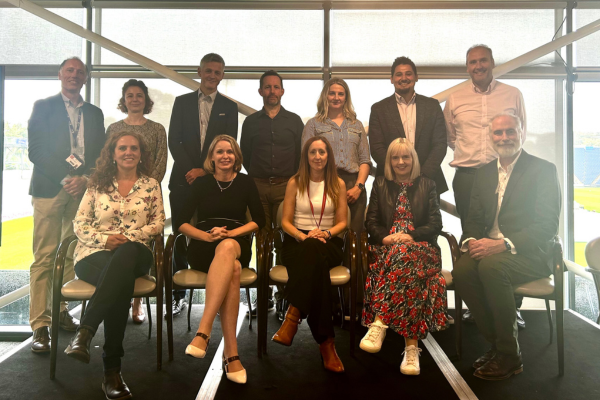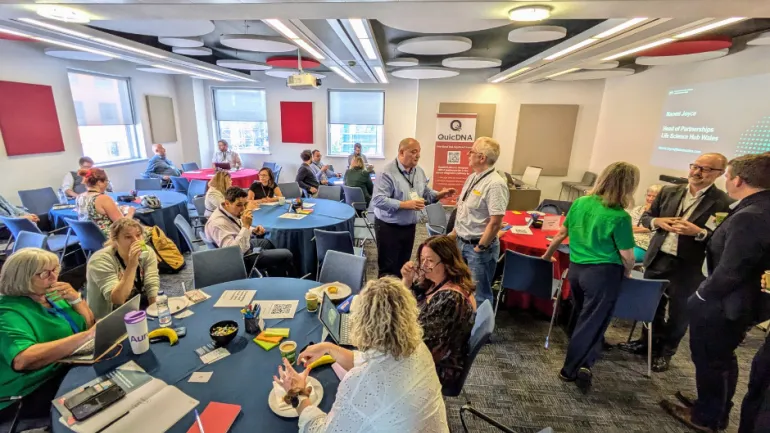The QuicDNA project, a pioneering ‘Real-World’ study aimed at integrating liquid biopsy technologies into the healthcare system in Wales, recently brought together partners to celebrate its progress and highlight the project’s ongoing study and future plans.

A testament to collaboration between multiple partners, this lung cancer liquid biopsy trial is now open to patients across Wales. Dr Rob Orford, CEO of Moondance Cancer Initiative, chaired the event, setting an energetic tone for the day, reflecting on the hard work and success of 2023-2024. Some key discussions from the day included…
Collaboration across sectors: The key to QuicDNA’s success
On behalf of Mike Emery (Chief Digital and Innovation Officer, Welsh Government), Jason Lintern (Health Innovation Lead, Welsh Government) took to the stage to share thoughts on the project journey so far, highlighting the transformative potential of QuicDNA, directly hearing from clinicians, patients and healthcare partners involved in this work.
“Lung cancer is one of the most common cancers in Wales, with many patients diagnosed at an advanced stage. Quicker diagnosis and targeted treatment can make a significant difference to the prognosis.
QuicDNA offers huge opportunities to speed up decision making in lung cancer treatment, where targeted treatments can be intiatied earlier, ultimately improving patient outcomes. It's an example of what we hope to see emerging from the Tackling Cancer Programme – more timely, accurate diagnoses and enhanced care pathways. “ Jason Lintern, Health Innovation Lead, Welsh Government.
The first session included a panel discussion on the project journey, with a specific focus on the importance of collaboration between industry, academia, the NHS and patients. The panel featured the two leads of the QuicDNA study - Sian Morgan (Director of All Wales Medical Genomics Laboratory Service) and Dr Magda Meissner (Academic Medical Oncology Consultant, Cardiff University and Velindre Cancer Centre). Additional panel members included Lewis Egal from the AWMGS and Amgen, Pilar Ramos, Illumina, Georgina Gardner Centre for Trials Research, Cardiff University), and Wendy Evans, Moondance Cancer Initiative. A key takeaway from the discussion was that working together across sectors is vital to maximising the benefits that QuicDNA can bring to cancer care in Wales.
“This project has led to big learnings that industry can collaborate together and demonstrates that we need to be more transparent in involving each other, especially to work towards one big objective to tackling cancer outcomes in Wales.” - Lewis Egal, Healthcare Solutions Manager, Amgen, and Project Manager of QuicDNA study – AWMGS
Clinical and patient impact: Faster diagnosis, better outcomes
A key focus at the event was the impact QuicDNA has had on patient care. Magda Meissner and Rachel Dodds from the All Wales Medical Genomics Service, led a discussion on the current lung cancer diagnostic pathway. Reflecting on the learnings so far, Magda reminded the audience of the project’s initial motivation. Lung cancer being the 4th most common and leading cause of cancer deaths, has a current pathway that takes 62 days – an unacceptably long wait. QuicDNA has demonstrated the need to improve this, reducing the time to treatment down to 26 days.
The ability to obtain faster results has allowed clinicians to begin treating patients sooner. This was highlighted by panellists Dr Paul Shaw, and Dr Mick Button, Consultant Clinical Oncologists at Velindre Cancer Centre. They, along with Dr Matthew Jones Respiratory Consultant at ABUHB, shared how the project has shifted their approach to patient care, highlighting the role that liquid biopsies have in reducing diagnostic wait times. This progress in monitoring and guiding treatments represents a significant leap forward in personalised medicine.
For patients like Craig Maxwell, his story resonated deeply during the event, highlighting how QuicDNA’s success isn’t just measured by numbers, but real-life stories of hope, resilience, and improved quality of life for patients. Craig, a huge advocate for the QuicDNA project, where his fundraising efforts have been instrumental in supporting QuicDNA, and allowing patients to receive treatment.
During the event, a heartfelt video showcased Craig’s story and his recent Coastal Path Challenge. Craig shared how being involved in QuicDNA has given him a sense of purpose during what has been the most challenging period of his life. His determination to champion the study, helping future patients access better diagnostic tools, has been a driving force behind his involvement.
“Unfortunately, it took 78 days for my diagnosis, and that was in no fault of the amazing doctors and nurses, it was just because the technology that they needed (in 2022) wasn’t available. That day on the 8th of September when we were told it was terminal and stage four, I was heartbroken. I thought about my life, my two young children and then I soon realised that I can’t change that, but what I can change, and what I can do is help the experience that we had and help the next family to see if they can change their experience.
“I’ve been able to support and help the All Wales Medical Genomics Team, and Centre for Trials Research to roll out this pilot scheme, which if it had been available for me, it could’ve probably taken my diagnosis down from 78 to 26 days, and I would’ve been on treatment sooner. Whilst it may not have given a different prognosis to the end position for me, it would’ve given me more quality time with my family.” – Craig Maxwell, Patient representative of the QuicDNA steering group.
Looking to the future: QuicDNA Max - expansion and innovation
The final session of the day discussed the future for the QuicDNA and genomic medicine in Wales, focusing on expansion plans and the application of liquid biopsy to other solid tumour types. Dr Magda Meissner and Sian Morgan shared their vision of QuicDNA Max, building on the project’s success by incorporating more cancers into the diagnostic pathway, making liquid biopsies a standard part of the clinical tool kit.
“Genomic innovation is advancing at pace, such as the introduction of liquid biopsy. Innovation within genomics will continue to develop, technology will develop, and a key driver for this will be the clinical urgency or need for the test and the ability to deliver it due to the technological advancements we are witnessing ” – Sian Morgan, Consultant Clinical Scientist, All Wales Medical Genomics (AWMGS) Laboratory Director.
The goals of QuicDNA are ambitious but clear – shortening the time to treatment, increasing the number of patients receiving targeted therapies, and improving overall patient outcomes by reducing the physical and emotional toll of lengthy diagnostic processes for lung cancer patients. The day was full of impact and emotion, although highlighted a brighter future for genomics in Wales.
“The QuicDNA project shows just how collaboration and innovation can drive real change. Seeing the impact of this innovative technology on patient outcomes, and hearing firsthand stories like Craig’s and other patients, reminds us why this work is so vital. The event was a great celebration of what’s been achieved so far and the efforts that have helped expand the project across six Health Boards in Wales.” - Rhodri Griffiths, Innovation Adoption Director, Life Sciences Hub Wales
Find out more about the project’s journey here.
Thank you to all partners and Health Boards involved in the QuicDNA project, with QuicDNA continuing to grow, it remains a forefront example of how innovative technology and collaboration can revolutionise patient care:
All Wales Medical Genomic Services (AWMGS), Centre for Trials Research - Cardiff University, Moondance Cancer Initiative, Tenovus Cancer Care, Craig Maxwell - Velindre Charity, Amgen, Illumina, AstraZeneca, Bayer, Lilly. Aneurin Bevan University Health Board, Betsi Cadwaladr University Health Board, Cardiff and Vale University Health Board, Cwm Taf Morgannwg University Health Board, Hywel Dda University Health Board, Swansea Bay University Health Board. Life Sciences Hub Wales, Health and Care Research Wales, Welsh Government.
Health and Care Research Wales (HCRW) funded the "Integration of Liquid Biopsy into the Lung Cancer Diagnostic Pathway" pilot project through Research for Public and Patient Benefit (RfPPB) Wales funding.



